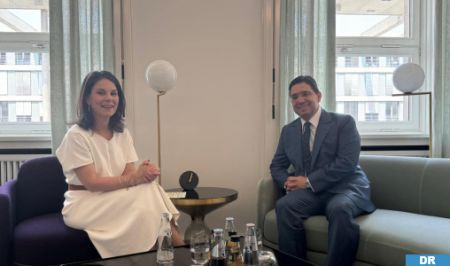
Germany hails Moroccan King’s contribution to peace and stability in the region; closely follows royal initiative to enable Sahel States access Atlantic Ocean
Germany commended the social and economic reforms carried out by Morocco, and the kingdom’s active contribution to peace and stability in the region under the leadership of King Mohammed VI, and said it is closely following the royal initiative meant to enable Sahel States access the Atlantic Ocean.
Germany welcomed “the reforms carried out by Morocco, under the leadership of HM King Mohammed VI, for a more open and dynamic Moroccan society and economy,” states a joint declaration adopted in Berlin on Friday by the 1st session of the multidimensional strategic dialogue, co-chaired by German Foreign Minister Annalena Baerbock, and her Moroccan peer Nasser Bourita.
In the Declaration, Germany also praised Morocco’s active and constructive role and contribution to peace and stability in the region.
In this vein, Berlin reaffirmed Germany’s vision of Morocco as an essential partner of the European Union, NATO, and Germany in Africa, and a crucial link between North and South.
Germany also indicated that it was closely following the initiatives launched by King Mohammed VI for the African continent, including the Royal initiative meant to enable Atlantic Ocean access for Sahel States.
Germany is “closely following the initiatives launched by HM King Mohammed VI for the African continent, including that of November 6, 2023 for the Sahel region” aimed at facilitating access to the Atlantic Ocean for the countries of the region, underlines the joint declaration
At the end of this first session of the Dialogue, the two officials reaffirmed at a joint news conference their shared interest in pursuing the implementation of the Joint Declaration and strengthening the multi-faceted partnership in all policy areas.
They also reaffirmed their desire to further develop bilateral economic and trade relations, and encouraged economic players to join in the endeavor, underlining Morocco’s significant investment potential, as highlighted by the Moroccan Investment Charter.
In the field of migration cooperation, the two foreign ministers expressed their support for the work of the bilateral Joint Migration Group, which held its inaugural session on January 23, 2024, and welcomed the regular working meetings.
They agreed that reducing irregular migration is a common challenge and requires a comprehensive approach, guaranteeing international human rights standards. They thus agreed to continue improving professional mobility, legal migration, return, readmission, and reintegration.
In terms of security cooperation, they welcomed the joint declaration signed by the Interior Ministers on October 31, 2023, aimed at resuming cooperation in all areas of domestic policy.
They stressed their shared ambition to deepen dialogue to tackle terrorism and other security challenges together, notably within the Global Coalition against Daesh and the Global Counterterrorism Forum.
They underlined their fruitful cooperation in the fields of climate policy, biodiversity, renewable energies and green hydrogen, which will be intensified at a strategic level.
Likewise, Bourita and Baerbock agreed to promote bilateral cooperation in the cultural and academic fields and to strengthen ties between the two countries’ peoples.
They also placed particular emphasis on promoting regional and international peace and security, and strengthening multilateral institutions.
The Multidimensional Strategic Dialogue is held once every two years, alternately in Morocco and Germany, and is chaired by the Foreign Ministers of both countries.
This Strategic Dialogue is based on shared values and mutual respect, with the aim of establishing the principles and foundations of relations between Morocco and Germany, defining the bases on which they will be developed, and safeguarding the priority interests of both parties.
It serves as a basis for moving forward in bilateral relations and strengthening coherence between the different areas of bilateral cooperation.
It also acts as a platform for discussion and consultation on strategic matters of mutual interest, including regional and international security and development issues.
